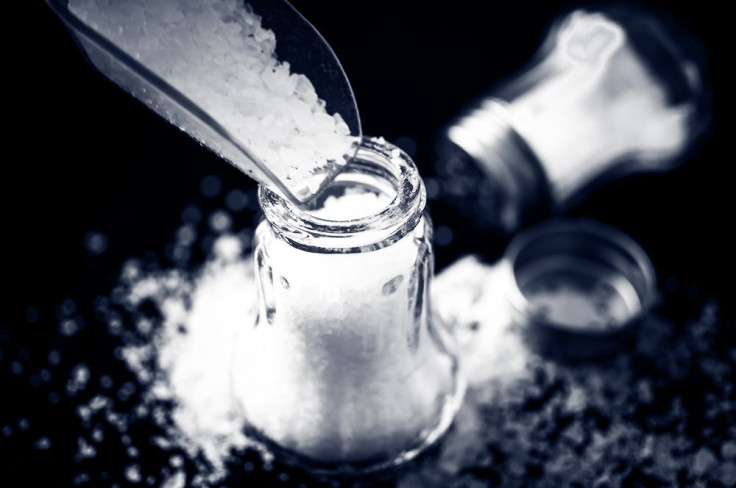Too Much Salt: How A Diet Too High In Sodium Can Affect Your Heart, Brain, And Even Bone Health

Salt has always been of high importance to humanity. In ancient Egypt, salt was an integral part of religious ceremonies, and the Moors in Africa would trade salt pound for pound with gold. Part of our adoration for salt, however, lies in its main ingredient, sodium. (It's also composed of chloride and iodine sources.) According to the American Heart Association, about 75 percent of the sodium we consume comes not from the salt shaker, but rather in processed and restaurant food.
Our Love Affair With Salt
Sodium is essential to human health. The mineral helps to regulate fluids by letting the body know when it’s time to replenish or dispose of water. Along with that, sodium also maintains nerve transmissions and muscle contractions — functions vital to our survival. As a result, our bodies evolved a desire for sodium akin to addiction to ensure that we never went without enough.
A 2011 Australian study found that the brain responds to sodium similar to how it does for substances such as heroin, cocaine, and nicotine, which may explain why so many of us tend to overindulge in high-sodium foods. Unfortunately, too much of a good thing can actually prove deadly.
Your Brain On Salt
A 2011 Canadian study on 1,200 older sedentary adults with normal brain function found that over the course of three years, high-sodium diets were linked to increased risk of cognitive decline. This result was “independent of hypertension and global diet quality” and “suggests that sodium intake alone may affect cognitive function in sedentary older adults above and beyond the effects of overall diet,” the researchers wrote.
The reason why sodium is detrimental to the brain is not fully understood, but according to Dr. David L. Katz, a researcher involved in the study, physical exercise may be able to protect the brain from the effects of too much salt, Medscape reported.
Kidneys
Sodium plays a key role in balancing the levels of fluid in our bodies by signaling to the kidneys when to retain water and when to get rid of water. A high-sodium diet can interfere with this delicate process and reduce kidney function. The result is less water removed from the body, which may lead to higher blood pressure. As explained by The World Action on Salt and Health, this excess strain on the kidneys can lead to kidney disease or exacerbate kidney problems in those already with the condition.
High-sodium diets may also increase your risk of developing renal stones, also known as kidney stones. The main cause of kidney stones is urinary calcium, a mineral which is noted to increase in those with high-sodium intake.
Bones
Excessive calcium excretion in the urine is believed by some experts to increase the risk of bone thinning. According to WASH, over long periods of time, this excessive calcium loss is associated with osteoporosis, especially in postmenopausal women.
Heart
Due to salt’s fluid retention effect, in some individuals excessive amounts of salt in their diet can lead to high blood pressure. High blood pressure is the force of blood pushing against the walls of the arteries as the heart pumps blood, and high blood pressure can lead to many serious conditions, such as stroke and heart failure. Although blood pressure increases naturally with age, according to the American Heart Association, reducing your salt intake can help prevent your blood pressure from increasing too much.
Skin
Excessive salt in the diet can cause a symptom known as edema. As reported by Medical News Today, edema is characterized by swelling, particularly in the hands, arms, ankles, legs, and feet, caused by fluid retention. Excessive salt consumption commonly causes edema; however, the symptom can be caused by a number of other health concerns ranging from menstruation to genetic disposition. Edema is non-life threatening and is a symptom of another underlying health condition, rather than a condition on its own.
While edema may be an extreme symptom of excessive salt consumption, even something as simple as having an extra-large popcorn the night before can leave your skin looking a bit puffier than usual. Dr. Neal B. Schultz, a dermatologist practicing in New York City, told Shape that susceptibility to swelling due to salt consumption increases with age.
Stomach
A 1996 study published in the International Journal of Epidemiology found that death from stomach cancer in both men and women was closely linked to salt consumption. High salt intake is also associated with stomach ulcers. The reason for this is not completely understood, but one study theorized that the salt may have an adverse effect on the mucous lining of the stomach and cause the stomach tissue to become abnormal and unhealthy, according to Livestrong.
Published by Medicaldaily.com



























